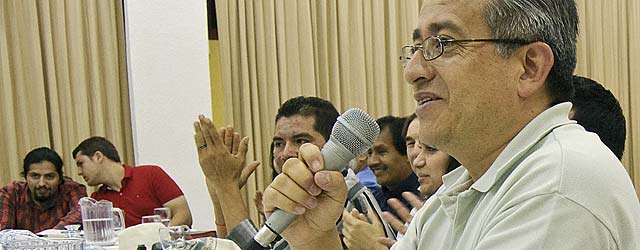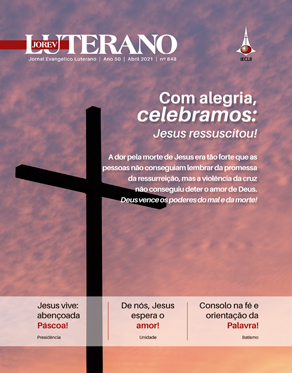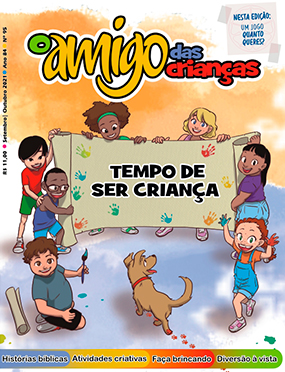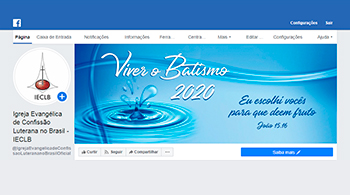
Lutheran leaders from Latin America and the Caribbean have addressed the challenge of preaching the gospel in diverse and disenfranchised cultures, calling for new theological language, holistic mission efforts and support for youth in their churches.
The Latin American and the Caribbean Leadership (LAC) Conference was held in Managua, Nicaragua, 15-19 April, hosted by The Nicaraguan Church of Faith and Hope (ILFE) under the theme “Lutheran Churches, Churches of the Word.”
It was organized by the Lutheran World Federation (LWF) Department for Mission and Development (DMD) LAC desk in collaboration with the Nicaraguan church. Some 50 LAC leaders attended the annual event, which serves as a platform for decision making, reporting, collaborating and networking.
Leaders recognized both the challenges and opportunities represented in trends such as growing secularism and indifference to faith and religion and the need to revise the theological language used to proclaim the word of God in the different cultural realities in predominately Roman Catholic countries.
Many of the LAC leaders expressed concern about how to preach the word of God in the context of poverty, increasing violence and climate change.
Rev. Gustavo Gómez, president of The United Evangelical Lutheran Church of Argentina (IELU), spoke about the challenges of being an inclusive church in a multi-faceted society, where the notion of diversity is changing.
It is a struggle to find the Lutheran identity in an evolving world, he added. “When we think of the Lutheran identity, we think of large churches with wooden pews and a pipe organ, filled with light skinned people speaking German or English.
“If we have that as our perspective, we will never be 100 percent Lutheran. The Lutheran community is transforming into something new, something with new faces and expressions,” Gómez emphasized.
Rev. Emilio Aslla, president of The Bolivian Evangelical Lutheran Church (IELB), spoke of the diverse nature of his church. “We say ‘diverse’ because our church is multi-cultural, multilingual. We speak Spanish, Aymara, Quechua, Guaraní, amongst other languages and every community has their own history and customs.”
Aslla recounted that when Christian missionaries originally came to Bolivia, the indigenous people were told to leave their cultures behind. “It has been a painful process but we are now looking to embrace our diversities. The challenge is: how do we continue to be Lutheran without forgetting our history?”
The Bolivian church leader reflected on the lack of theological resources available to help reach the indigenous in the region. “There are many people in Bolivia that cannot be reached without the right tools,” he added. “It is a fundamental issue that we need to continue discussing.”
The future is young
Throughout the conference the “Creatitude” program developed by The Evangelical Church of the Lutheran Confession in Brazil (IECLB), to engage youth participation in creative ways, was used by delegates to take part in panel discussions and presentations.
Addressing the meaning of being a young church where 42 percent of the Lutheran population is under the age of 25, Bishop Eduardo Martínez of The Evangelical Lutheran Church of Colombia (IELCO) said that “it is a reason to celebrate.
“We feel our church has a promising future. It fills us with hope that our church will be maintained in the following years with new leaders and Lutheran people working in the church and society,” Bishop Martinez added.
However the IELCO is challenged to find ways to move young people to embrace their faith. “We want to assist the youth to grow in their spirituality as human beings. We have to orient our ministries to work with them in a way that they feel they belong.”
Lutheran formation and education is central
Theological education and formation was also a central theme of the conference. Churches analyzed their struggles to better respond with pastoral skills to challenging and changing societies.
They affirmed that theological education and formation should consider the social contexts and vulnerable populations. Bishop Melvin Jiménez of The Lutheran Church in Costa Rica (ILCO) stated that, “Pastors should be equipped to preach and offer pastoral support while also engaging in the initiative of human rights and advocacy.”
An emphasis on theological practices needs to be put in the theological education system to support diakonia and participation at all levels of church and society, the LAC leaders noted. Member churches agreed to enhance local efforts on theological education using online training, by bridging the generational gap by having younger leaders as mentors to help the older generation gain new technology skills.
“The contribution towards 2014 from the leadership conference has brought a rich reflection about the Lutheran heritage that is being contextualized and invites to reform our theological education and formation processes,” stated Rev. Dr Patricia Cuyatti, LWF area secretary for LAC.
Leaders determined the focus for the leadership conference in 2014 would be on practical theology, hermeneutics from the LAC perspective, on-line education, the role of theology in the ecumenical and inter-religious world, and theological education and formation considering the world economy.
All themes will be reflected upon using a gender perspective.














